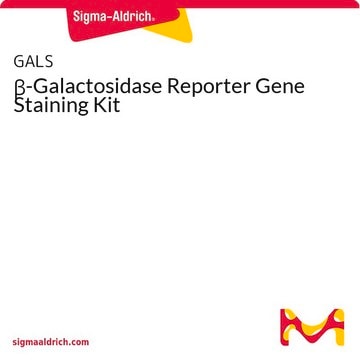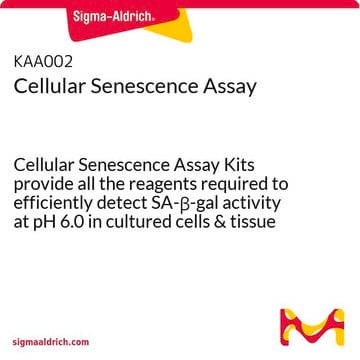GALA
β-Galactosidase Reporter Gene Activity Detection Kit
Sign Into View Organizational & Contract Pricing
All Photos(1)
About This Item
UNSPSC Code:
12352200
NACRES:
NA.32
Recommended Products
sterility
0.2 μm filtered
Quality Level
usage
kit sufficient for 65 tests
shipped in
dry ice
storage temp.
−20°C
Other Notes
The substrate used in this kit is o-nitrophenyl β-D-galactopyranoside (ONPG). ONPG generates a yellow color upon hydrolysis.
related product
Product No.
Description
Pricing
Signal Word
Warning
Hazard Statements
Precautionary Statements
Hazard Classifications
Skin Sens. 1
Storage Class Code
10 - Combustible liquids
Flash Point(F)
Not applicable
Flash Point(C)
Not applicable
Certificates of Analysis (COA)
Search for Certificates of Analysis (COA) by entering the products Lot/Batch Number. Lot and Batch Numbers can be found on a product’s label following the words ‘Lot’ or ‘Batch’.
Already Own This Product?
Find documentation for the products that you have recently purchased in the Document Library.
Customers Also Viewed
Christian Keggi et al.
Journal of industrial microbiology & biotechnology, 46(1), 1-11 (2018-11-01)
A draft genome of Paenibacillus amylolyticus 27C64 was assembled and a total of 314 putative CAZymes in 108 different families were identified. Comparison to well-studied polysaccharide-degrading organisms revealed that P. amylolyticus 27C64 has as many or more putative CAZymes than
Chao-You Pang et al.
Molecular & cellular proteomics : MCP, 9(9), 2019-2033 (2010-06-08)
The quality of cotton fiber is determined by its final length and strength, which is a function of primary and secondary cell wall deposition. Using a comparative proteomics approach, we identified 104 proteins from cotton ovules 10 days postanthesis with
Ivana A Cavello et al.
Biotechnology research international, 2015, 952921-952921 (2015-12-24)
Purpureocillium lilacinum (Thom) Samsom is one of the most studied fungi in the control of plant parasitic nematodes. However, there is not specific information on its ability to inhibit some pathogenic bacteria, fungi, or yeast. This work reports the production
Claudia Massa et al.
The Biochemical journal, 407(2), 207-217 (2007-07-14)
We have recently isolated and heterologously expressed BcPeh28A, an endopolygalacturonase from the phytopathogenic Gram-negative bacterium Burkholderia cepacia. Endopolygalacturonases belong to glycoside hydrolase family 28 and are responsible for the hydrolysis of the non-esterified regions of pectins. The mode of action
V Hugouvieux et al.
Applied and environmental microbiology, 63(6), 2287-2292 (1997-06-01)
The production of endopolygalacturonase (endoPG) by Colletotrichum lindemuthianum, a fungal pathogen causing anthracnose on bean seedlings, was enhanced when the fungus was grown in liquid medium with L-arabinose or L-rhamnose as the sole carbon source. These two neutral sugars are
Our team of scientists has experience in all areas of research including Life Science, Material Science, Chemical Synthesis, Chromatography, Analytical and many others.
Contact Technical Service











